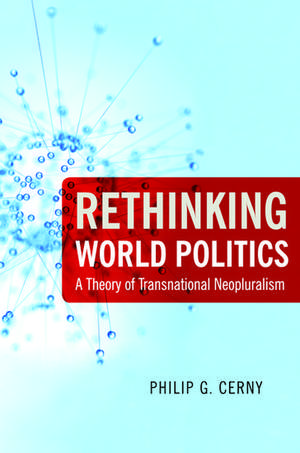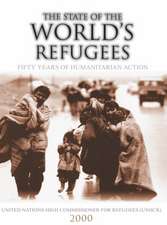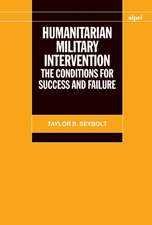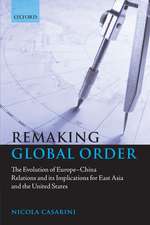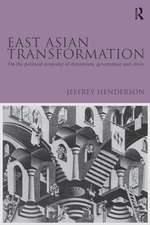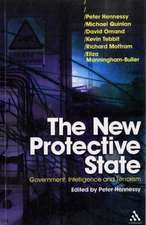Rethinking World Politics: A Theory of Transnational Neopluralism
Autor Philip G. Cernyen Limba Engleză Paperback – 8 apr 2010
| Toate formatele și edițiile | Preț | Express |
|---|---|---|
| Paperback (1) | 258.45 lei 31-37 zile | |
| Oxford University Press – 8 apr 2010 | 258.45 lei 31-37 zile | |
| Hardback (1) | 362.13 lei 31-37 zile | |
| Oxford University Press – 4 mar 2010 | 362.13 lei 31-37 zile |
Preț: 258.45 lei
Preț vechi: 285.50 lei
-9% Nou
Puncte Express: 388
Preț estimativ în valută:
49.46€ • 51.77$ • 41.16£
49.46€ • 51.77$ • 41.16£
Carte tipărită la comandă
Livrare economică 21-27 martie
Preluare comenzi: 021 569.72.76
Specificații
ISBN-13: 9780199733705
ISBN-10: 0199733708
Pagini: 352
Ilustrații: 10 b/w illus.
Dimensiuni: 231 x 155 x 25 mm
Greutate: 0.5 kg
Editura: Oxford University Press
Colecția OUP USA
Locul publicării:New York, United States
ISBN-10: 0199733708
Pagini: 352
Ilustrații: 10 b/w illus.
Dimensiuni: 231 x 155 x 25 mm
Greutate: 0.5 kg
Editura: Oxford University Press
Colecția OUP USA
Locul publicării:New York, United States
Recenzii
In the crowded marketplace of globalization studies, Philip Cerny offers a refreshing and ambitious entry...Cerny has performed an admirable service in offering this original vision of world politics in the new century.
This is a remarkably sure-footed book and a thought-provoking read for anyone who is interested in system-level theorizing...an ambitious book that can be enjoyed equally by sympathizers and critics...Anyone who works on International Relations theory should have this book in their library.
A sweeping Big Picture survey of global changes in areas as diverse as global finance, democracy and security...[Cerny] creatively remoulds existing concepts from diverse backgrounds to make them relevant for a rapidly changing global order...anybody interested in the larger transformative forces that are reshaping international relations will find this a stimulating and often provocative read...The book deserves a wide readership on both sides of the transatlantic divide.
A heroic effort at understanding the formidably complex global system that results from the interaction of states and of globalization. Cerny must be congratulated for the scope of his analysis and of his ambition.
In this wide-ranging and erudite book, Cerny probes the deep forces currently transforming the political structures underpinning ever more open societies and economies. His novel approach to understanding those forces deserves to be engaged and widely debated. Students of international political economy and related fields will learn much from grappling seriously with his core insights.
The study of international relations has traditionally been dominated by state-centric approaches. This book challenges students of international relations to think about world affairs from alternative perspectives and to question the applicability of traditional approaches to the 21st century.
Twenty years ago, Phil Cerny published The Changing Architecture of Politics (1990), one of the books that did most to reshape our thinking about politics, domestic and international, in the 1990s; Rethinking World Politics looks likely to be equally influential in the 2010s. Once again, Cerny successfully employs a wide range of sources, presenting new readings of otherwise familiar topics such as globalisation. Particularly valuable is his use of ideas drawn from classical American pluralism to flesh out his account of 'transnational neopluralism'. This is a book that will be widely read, and frequently returned to.
This is a remarkably sure-footed book and a thought-provoking read for anyone who is interested in system-level theorizing...an ambitious book that can be enjoyed equally by sympathizers and critics...Anyone who works on International Relations theory should have this book in their library.
A sweeping Big Picture survey of global changes in areas as diverse as global finance, democracy and security...[Cerny] creatively remoulds existing concepts from diverse backgrounds to make them relevant for a rapidly changing global order...anybody interested in the larger transformative forces that are reshaping international relations will find this a stimulating and often provocative read...The book deserves a wide readership on both sides of the transatlantic divide.
A heroic effort at understanding the formidably complex global system that results from the interaction of states and of globalization. Cerny must be congratulated for the scope of his analysis and of his ambition.
In this wide-ranging and erudite book, Cerny probes the deep forces currently transforming the political structures underpinning ever more open societies and economies. His novel approach to understanding those forces deserves to be engaged and widely debated. Students of international political economy and related fields will learn much from grappling seriously with his core insights.
The study of international relations has traditionally been dominated by state-centric approaches. This book challenges students of international relations to think about world affairs from alternative perspectives and to question the applicability of traditional approaches to the 21st century.
Twenty years ago, Phil Cerny published The Changing Architecture of Politics (1990), one of the books that did most to reshape our thinking about politics, domestic and international, in the 1990s; Rethinking World Politics looks likely to be equally influential in the 2010s. Once again, Cerny successfully employs a wide range of sources, presenting new readings of otherwise familiar topics such as globalisation. Particularly valuable is his use of ideas drawn from classical American pluralism to flesh out his account of 'transnational neopluralism'. This is a book that will be widely read, and frequently returned to.
Notă biografică
Philip G. Cerny is Professor of Global Political Economy in the Department of Politics and International Studies and the Division of Global Affairs, Rutgers University-Newark, New Jersey, U.S.A., and Professor Emeritus of Government at the University of Manchester, United Kingdom. He studied at Kenyon College (Ohio) and the Institut d'Études Politiques (Paris), and received his Ph.D. from the University of Manchester in 1976. He has taught at the Universities of York, Leeds and Manchester in the U.K., and has been a visiting scholar or professor at Harvard University, the Fondation Nationale des Sciences Politiques (Paris), Dartmouth College, New York University, the Brookings Institution, and the Max Planck Institute for the Study of Societies (Cologne). He is a former chair of the International Political Economy Section of the International Studies Association and has been a member of the executive committees of the British International Studies Association and the Political StudiesAssociation of the United Kingdom. He has written extensively on political theories of the state and globalization.
